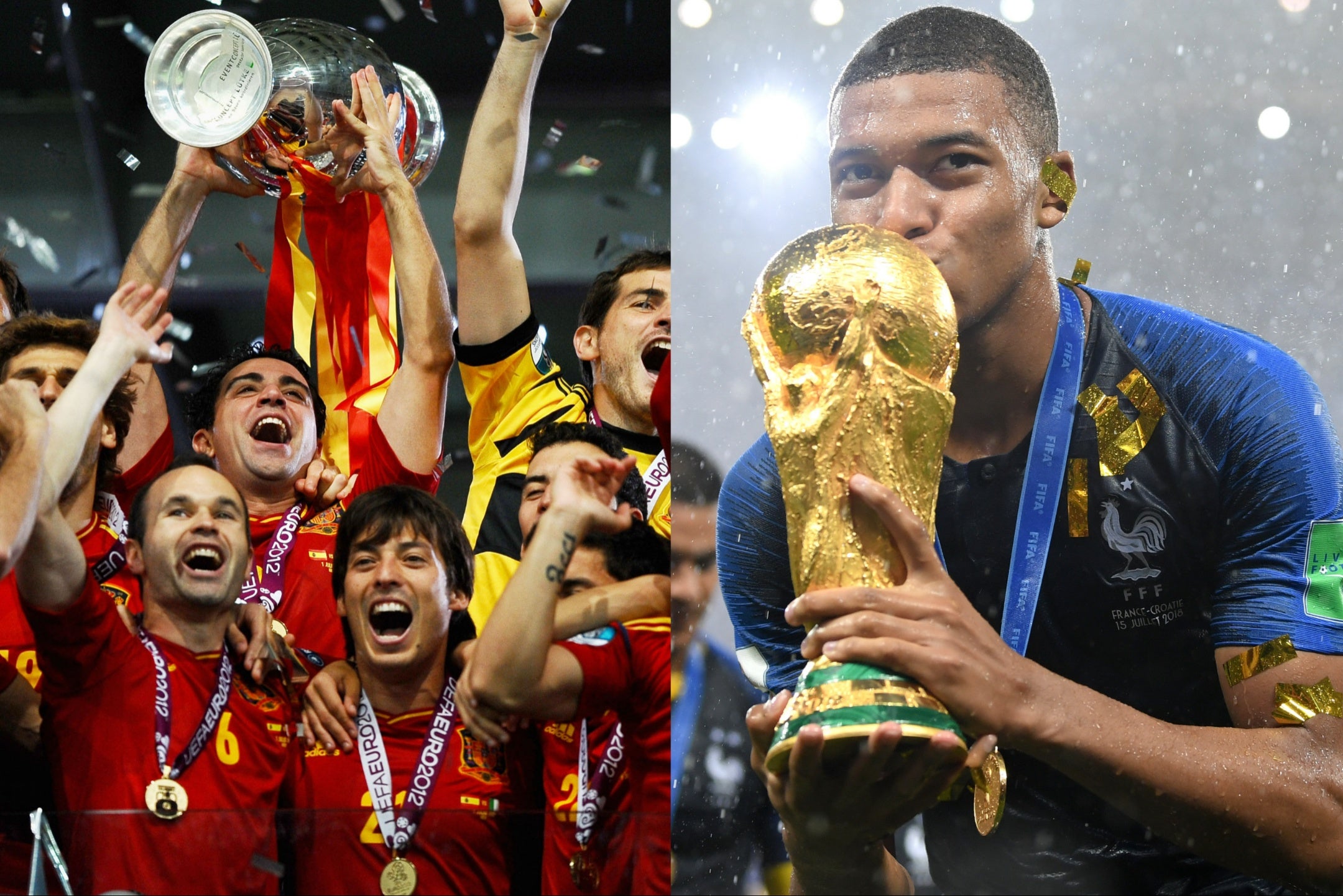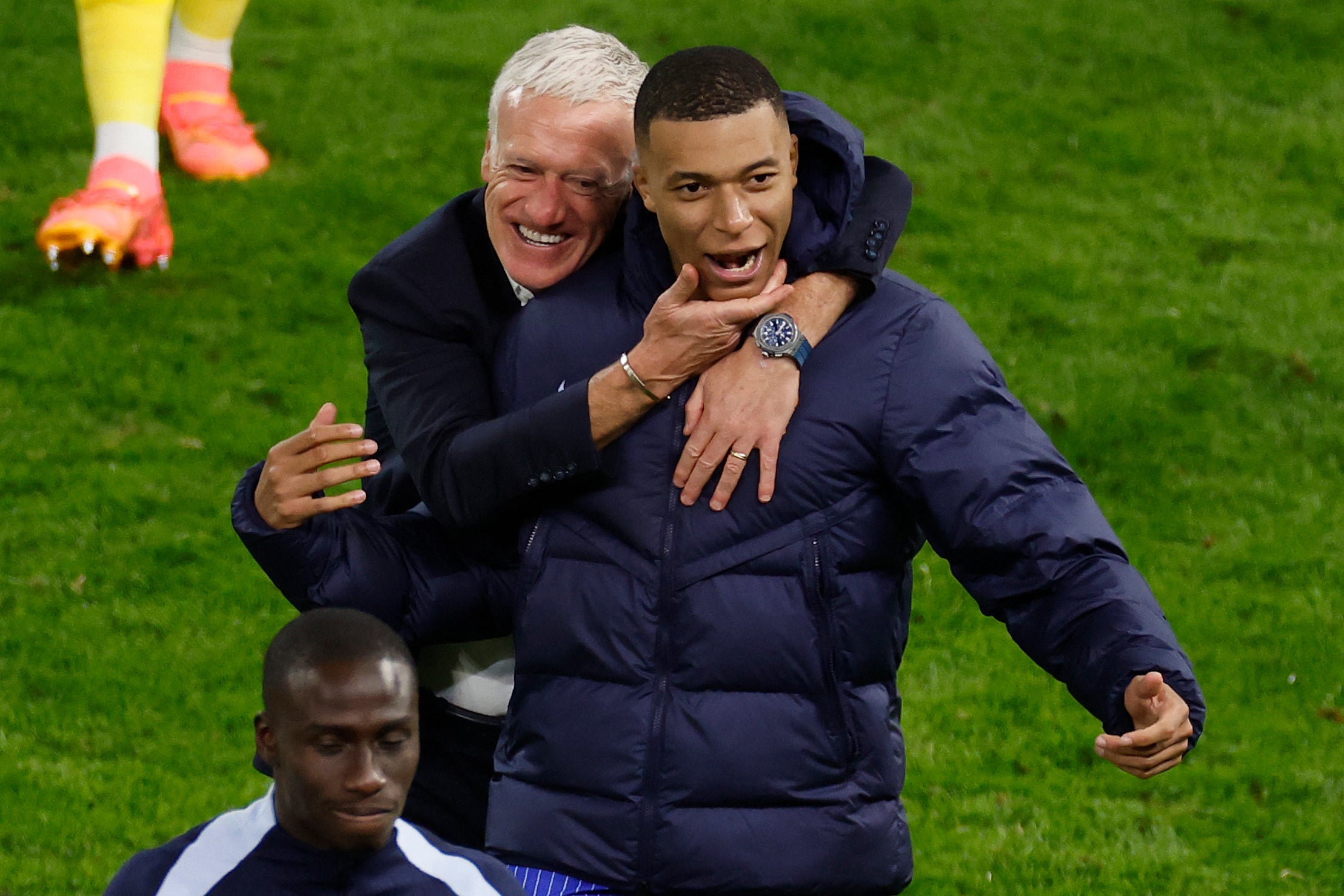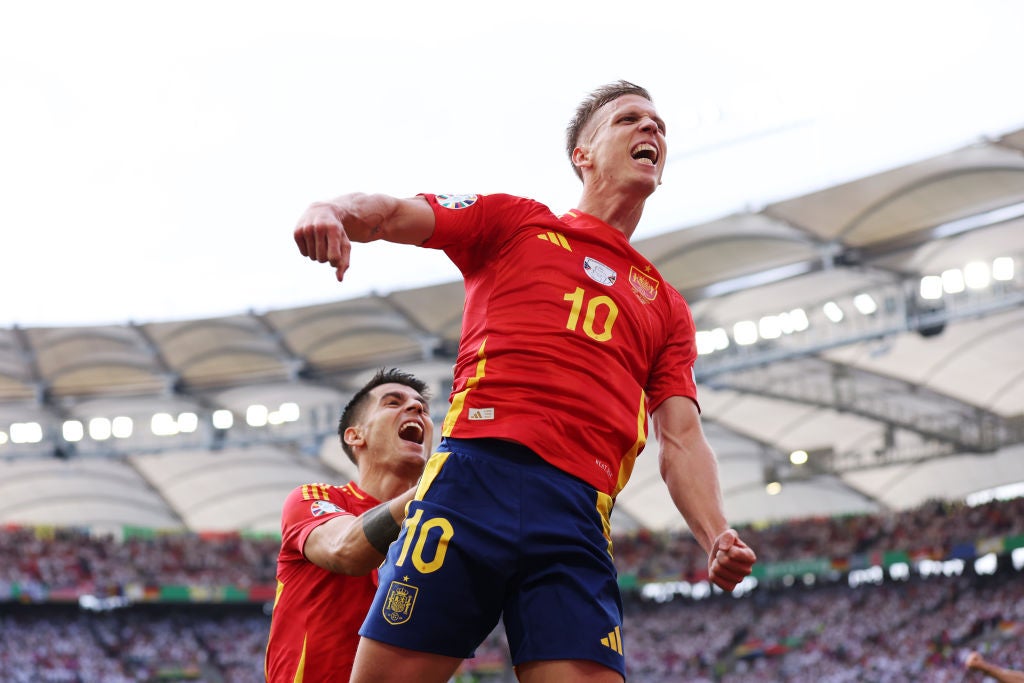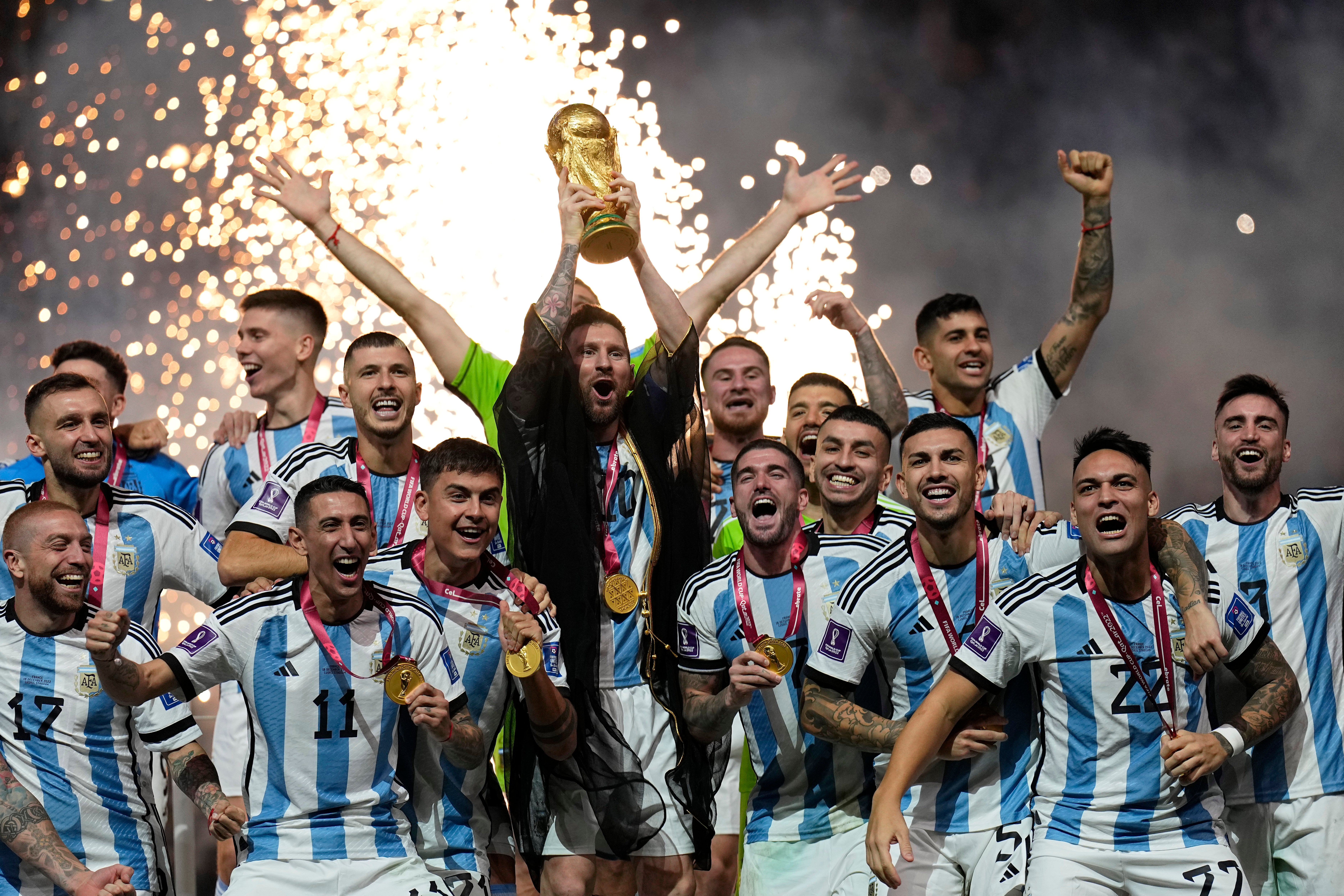France’s ‘tournament ball’ or Spain’s ideology – how do you actually win the Euros?
Euro 2024 has become a tournament of competing approaches and Miguel Delaney explains how the final result will decide the championship’s legacy


Support truly
independent journalism
Our mission is to deliver unbiased, fact-based reporting that holds power to account and exposes the truth.
Whether $5 or $50, every contribution counts.
Support us to deliver journalism without an agenda.

Louise Thomas
Editor
Lamine Yamal has been one of the few stars always worth watching at Euro 2024, which means he attracts a lot of defenders, so Luis De La Fuente is intent on making the 16-year-old see better team solutions. In training, the Spain manager has taken Yamal aside and told him “if you have three players on you, there’s an area where we have superiority – we must get the ball there, not by dribbling, but with fast passing”.
This is Spain, after all. De La Fuente has accelerated the team’s evolution from dogmatic possession, primarily through the use of Yamal and Nico Williams, but the approach is still based on the core ideology. The identity is too ingrained. Such advice still produced maybe the most beautiful play at Euro 2024, which was a wondrous one-touch passing move against Germany to turn defence into attack. It has been lacking from a lot of teams.
A problem with De La Fuente’s advice for the semi-final is that, in the French half, there are very unlikely to be any areas of numerical superiority. That is because Didier Deschamps constantly has one piece of advice of his own. That is to ensure there is always a packed defensive structure around the French goal. If the Spanish mindset is to give the ball, Deschamps’s is to give nothing away.
“We are solid,” he said this month. “That is essential in a major competition.”
Well, it’s potentially important, but history shows it isn’t as non-negotiable as Deschamps makes out. It is all why this semi-final distils a theme that has defined Euro 2024, and could yet decide it. This match between Spain and France also represents a clash between the two dominant approaches in trying to win a major tournament. That is playing according to a long-term ideology against playing for the next game. The inevitable term for the latter is “tournament ball” but it should maybe be more associated with Deschamps.
If Pep Guardiola is considered the figure who transformed club football, the French manager has arguably had the greatest influence on modern international football. Teams like England have actively sought to replicate Deschamps’s approach.

To complete the semi-finalist quartet’s place in this conversation, it should never be overlooked that all of this is based on how you shape a pool of talent created because of Dutch coaching philosophy. All of France, Spain and England industrialised youth production methods first seen in the Netherlands. Now, coming full circle, Ronald Koeman also leans towards Deschamps.
That way is admittedly about much more than defensive caution. Gareth Southgate attempts to ensure his camp can control every element you possibly can in competitions that are still decided by a significant degree of blind luck. That goes from penalties to substitution times. Southgate talks of being “tournament-wise”. Such an insistence on control has this time developed into a restraint that has slowed the entire tournament. It has also influenced a debate over whether Euro 2024 is “boring”, with a lot of commentary from South America over the state of European teams. Spain are being cast as saviours of the tournament, which is itself a shift from the Euro 2012 debate over whether their possession was “boring”.
Although Euro 2024 feels worse because two of the notionally best squads are playing within themselves, not all of this is down to intent. Many players have come to Euro 2024 exhausted. International managers have had to work within that. Teams are consequently pushed to extremes, since both sitting deep or falling back on ingrained philosophy do not require much extra training. Deschamps is still taking this to its limits.

While this version of Spain are among the most prolific ever Euros semi-finalists, with 2.2 goals per game, France are the least prolific. Their three from five are much worse than Greece’s forgettable five from four in 2004.
Highest-scoring European Championship semi-finalists
Team | Goals | Games | Rate p/g |
|---|---|---|---|
Netherlands 2000 | 13 | 4 | 3.25 |
France 1984 | 9 | 3 | 3 |
Denmark 1984 | 8 | 3 | 2.67 |
Czech Republic 2004 | 10 | 4 | 2.5 |
Spain 2020 | 12 | 5 | 2.5 |
Lowest-scoring European Championship semi-finalists
Team | Goals | Games | Rate p/g |
|---|---|---|---|
France 2024 | 3 | 5 | 0.6 |
Portugal 1984 | 2 | 3 | 0.67 |
Denmark 1992 | 2 | 3 | 0.67 |
England 2024 | 5 | 5 | 1 |
Italy 2012 | 4 | 4 | 1 |
France’s minimalism is also seen in how there is the lowest differential of all semi-finalists between their scoring and defensive records – 0.67 to 0.2 goals per game.
With just one goal conceded in five games, Deschamps would say that got them here. The only semi-finalists to concede fewer were England at Euro 2020, who weren’t breached until Denmark’s goal at Wembley.
European Championship semi-finalists with best defensive records
Team | Goals | Games | Rate p/g |
|---|---|---|---|
England 2020 | 0 | 5 | 0 |
France 2024 | 1 | 5 | 0.2 |
Germany 2016 | 1 | 5 | 0.2 |
Spain 2012 | 1 | 4 | 0.25 |
Germany 1996 | 1 | 4 | 0.25 |
European Championship semi-finalists with worst defensive records
Team | Goals | Games | Rate p/g |
|---|---|---|---|
Turkey 2008 | 6 | 4 | 1.5 |
Czech Republic 1996 | 6 | 4 | 1.5 |
Germany 1992 | 4 | 3 | 1.33 |
Russia 2008 | 5 | 4 | 1.25 |
France 2000 | 5 | 4 | 1,25 |
Euro 2020 deepened Deschamps’s approach, since he was scarred by how France let Switzerland come back to 3-3 from 3-1 down in the last 16 to win on penalties. That has now been compounded by Kylian Mbappe’s lack of fitness. France can be electric when their fast players are allowed break, which is why Spain scoring first might be essential to the spectacle.
Such historical comparisons bring bigger questions about what actually works best, as well as legacy. The latter does matter, although only in bigger debates after winning a trophy.
If you take 2008 as a watershed, where Guardiola re-interpreted pressing, it is close in terms of Euros and World Cup winners. The Spain team that started a record run of success that very year were unique, but those three consecutive trophies make them one of three “ideology” champions including Germany 2014 and – to a lesser extent – Italy 2020. Portugal 2016 and France 2018 were obviously “tournament ball”.
Argentina 2022, a touch like Roberto Mancini’s Italy, were a hybrid. It is instructive that came in a mid-season tournament like Qatar, though, because it feels like that is becoming harder to do amid the physical exhaustion at the end of seasons. It’s easier for managers to go with what players know.

That plays into another dichotomy. The feeling around the Spanish camp is that France and England have superior talent, but that their integration into an ideology amplifies their talent.
Maybe this is the real difference. Ideology takes teams to higher levels but needs to go much further back, whereas “tournament ball” is easier for any given game, albeit harder to watch.
It is similarly instructive that Spain 2008-12 went to higher levels of achievements than even historic squads of comparable talent. Brilliant as they were, that ability was multiplied by the tactics. Against that, there is an argument Deschamps has even under-performed with France. The same is being said of Southgate’s England. They have certainly underwhelmed.
That doesn’t matter in the moment of victory – as Deschamps also repeats the line about “changing the channel” – but does matter as to how a team is remembered internationally, and the influence they have.
One reason that England even have this immense pool of talent is because they studied what Spain and Germany were doing 15 years ago, who themselves looked to the French and Dutch. While Spain and Germany brought youth teams through according to a national philosophy, that hasn’t been the case with England or France.
Hence De La Fuente worked with many of these players at youth level, repeating messages he gave them as kids. “I never tire of advertising the national product,” he said. Deschamps is meanwhile trying to figure out a new formation every game, just repeating the same message about solidity. The wide contrast can create narrow gaps in games, as well as genuinely compelling contests.
It means there is more than a final place at stake on Tuesday. There is also the influence and legacy of Euro 2024.
Subscribe to Independent Premium to bookmark this article
Want to bookmark your favourite articles and stories to read or reference later? Start your Independent Premium subscription today.
Join our commenting forum
Join thought-provoking conversations, follow other Independent readers and see their replies
Comments